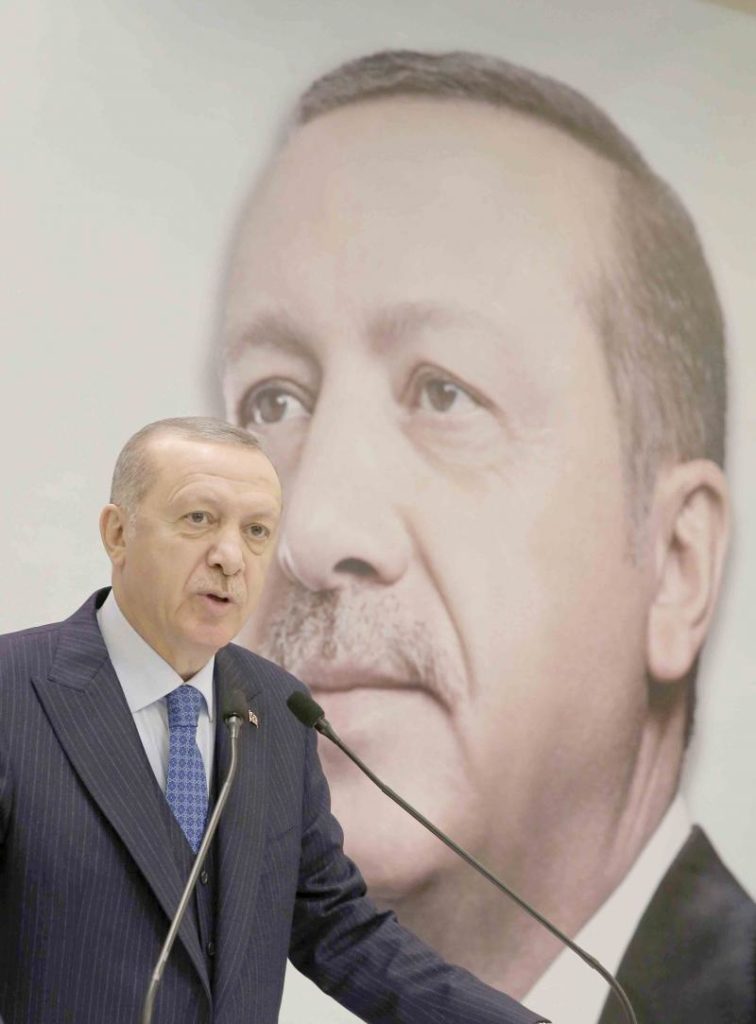Nearly three years after the failed coup that triggered a massive crackdown in Turkey, Turkish President Recep Tayyip Erdogan’s government is still hunting down those it deems dangerous to the country.
Just days ago, there were 192 arrests across Turkey, adding to the numbers imprisoned, sacked or suspended from their jobs. An estimated 77,000 people await trial in prison and 150,000 bureaucrats, university teachers and others have been dismissed or regarded as suspect.
The implications go much beyond arrested life trajectories. Turkey has become a state permanently in crisis or so goes the story told by Erdogan.
History suggests a different narrative. History tells us that a crisis — real or manufactured — can be invaluable for politicians who find democratic checks and balances inconvenient. As happened in the Philippines in the 1970s, Peru in the early 1990s and then-Prime Minister Vladimir Putin’s Russia in the late 1990s, Erdogan has used security considerations as a justification to arrogate power to himself.
The difference between Erdogan and almost all those listed above is clear. Turkey’s strongman made his intentions public much before the aborted 2016 coup. In 2012, he signalled his inclination to do something that legal scholars call “constitutional retrogression,” the subtle, incremental erosion of democracy. Erdogan did not hide his plans or his motives.
Erdogan in 2012 was serving his third term as prime minister and was constitutionally barred from seeking a fourth. It was widely expected Erdogan would change his political role as well as the rules to suit himself. He made known he was eyeing the presidency and that he wanted to overhaul the largely ceremonial post to make it all-powerful.
What’s significant about the Turkish storyboard is the way it played out. Despite Erdogan’s conspicuous, possibly incautious signalling of his intentions, all that he planned came to pass.
Erdogan became Turkey’s president in 2014 and engineered the succession as prime minister of Ahmet Davutoglu, his foreign minister and former foreign policy adviser. Davutoglu was reasonably pliant until he wasn’t, at which point he was replaced.
In April 2017, Erdogan narrowly won a referendum to expand presidential powers and the right to stay in office until 2029. His government arrested journalists, fired civil servants, engineered media takeovers and abolished institutional safeguards.
The point about Erdogan’s audacious power grab is that it worked — and worked all too well. Despite Turkey’s subsequent downgrading on various democracy indices, it is still counted as a flawed democracy rather than a failing pariah state.
This is an indictment of democracy in the 21st century and solidifies an argument advanced by University of Chicago Law School professors Aziz Huq and Tom Ginsburg about democratic decay.
Huq and Ginsburg argued that democratic decay could happen one of two ways: By “authoritarian reversion,” a rapid and near-complete collapse of democratic institutions or by constitutional retrogression, which would entail “a more subtle, incremental erosion of the three institutional predicates of democracy: competitive elections; rights of political speech and association; and the administrative and adjudicative rule of law.”
The professors showed that, over the past 25 years, the risk of reversion has declined but that of retrogression has spiked.
Turkey, just like Hungary, Poland, Bangladesh and others, exemplifies the growing attractiveness of constitutional regression. It preserves an illusion and elides the reality.
Consider Poland and Hungary, both members of the European Union, a bloc that continually extols the virtues of democracy.
In Poland, the elected government has undermined judicial independence, co-opted the state media and played partisan politics with the bureaucracy.
In Hungary, elections are free but unfair in that Prime Minister Viktor Orban’s government controls the airwaves and media companies, floats bogus political parties to divide the opposition vote, has rewritten parts of the constitution and gerrymandered liberal parliamentary districts in the ruling Fidesz party’s favour.
This is “state capture,” to use a phrase coined by South Africans in a slightly different context. That it happens by apparent public endorsement — ballots cast in a general election or referendum — makes it harder to categorise or criticise but it’s right to recognise the way things are.
In their 2018 book “How Democracies Die,” Harvard professors Steven Levitsky and Daniel Ziblatt noted that “blatant dictatorship — in the form of fascism, communism or military rule — has disappeared across much of the world since the end of the Cold War, most democratic breakdowns have been caused not by generals and soldiers but by elected governments themselves.”
Turkey is a textbook example of democratic deconstruction legitimised at the ballot box. It is a doleful story and one that unfortunately travels well.


